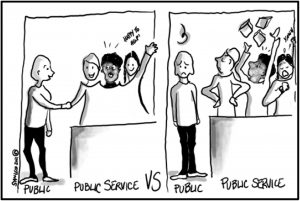Current Projects
Governing under uncertainty: Does public service motivation shield against burnout and boost job satisfaction?
WHAT IS THE STUDY ABOUT?
Public service employees are motivated by a desire to do good for others. The theory of Public Service Motivation (PSM) refers to the intrinsic motives driving public servants to engage in behaviours that benefit society and safeguard the public interest.
motivated by a desire to do good for others. The theory of Public Service Motivation (PSM) refers to the intrinsic motives driving public servants to engage in behaviours that benefit society and safeguard the public interest.
It is important that we study public service employment as roughly 25% of the Canadian workforce is employed in the public sector (Statistics Canada, 2022). A top priority of all orders of government is to attract and retain a public sector workforce that is motivated to do good for society, while minimizing employee disengagement, burnout, absenteeism, and turnover (Dutil and Migone, 2021). A motivated public sector workforce enhances performance (Ritz, 2009) and the quality of public service delivery (Taylor, 2007) and thereby increases the benefits to society, as illustrated in the graphic.
Public service jobs have a reputation of stability and continuity, however; over the last two years the work and social environment of the public service has been drastically transformed due to the COVID-19 pandemic. Work has evolved to include a work-from-home (WFH) component, and more importantly the content of work for many public servants included the delivery of governments’ ever changing COVID-19 responses.
We know that resilience to change plays an important role in the ability of the public service to fulfil its functions (Jarvis, 2016). The extent to which the new level of uncertainty is tolerated by individuals, and how this influences PSM, job satisfaction and burnout is unknown. This study aims to fill this gap in research.
STUDY PHASES
Phase 1
The first phase of this project is to conduct a realist review of existing PSM literature to better understand what factors (e.g., gender, age, religion) influence PSM and to learn more about how PSM influences various employment outcomes (e.g., satisfaction, turnover, burnout). The most recent review, which looked broadly at PSM, was published in 2014. It is our hope that the first phase of the project will provide an up-to-date and comprehensive review.
Phase 2
The second phase of this project will use survey methods to measure the impact of public servants’ tolerance for uncertainty on job satisfaction and burnout, as mediated through their motivations. This study will recruit employees of the Governments of Canada and Nova Scotia.
POTENTIAL BENEFITS OF THIS STUDY
Our results will have practical implications for the public service and its employees. An understanding of how uncertainty tolerance affects motivation, and how this translates into job satisfaction and burnout, can inform policies aimed at motivating public employees. Such policies may lead to increased job satisfaction, reduced burnout, and ultimately enhance the quality of public services delivered to Canadians.
RESEARCH TEAM
See full bios for each team member here

Dominika Wranik

Isabelle Caron

Colin Conrad

Dana Kabat-Farr

Nachum Gabler

Lanxi Wang

Fiona Jensen
PROJECT UPDATES AND NEWS
FUNDERS



